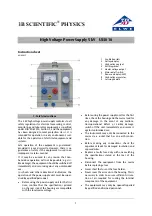
3B Scientific GmbH • Rudorffweg 8 • 21031 Hamburg • Germany •
www.3bscientific.com
Subject to technical amendments
© Copyright 2008 3B Scientific GmbH
2. Description
The 5 kV high voltage power supply is a universally
usable non-earthed high voltage source for operat-
ing electron tubes.
It provides a continuously variable stabilized high
voltage with passive current limitation, in a hous-
ing that is safe to handle. It also incorporates a
transformer, insulated against high voltage, to
supply the cathode heater voltage for an electron
tube. A temperature-controlled fan protects the
equipment from overheating.
The U33010-115 high voltage power supply is for
operation with a mains voltage of 115 V (
±
10%),
and the U33010-230 unit is for operation with a
mains voltage of 230 V (
±
10%).
3. Technical data
Mains voltage:
see rear of housing
High voltage output:
0 - 5000 V DC, max. 2 mA
Heater voltage output:
6.3 V AC, max. 3 A, high
voltage resistant up to 6
kV
Overload protection:
Primary fuse: see rear of
housing
Secondary protection:
current-limiting resistors
Terminals:
4 mm safety sockets
High-voltage display:
analogue
Dimensions: 235x130x155
mm
3
ap-
prox.
Weight:
3.5 kg approx.
4. Operation
4.1 General information
•
Before switching on the power supply, set the
high voltage regulator to zero (turn fully to the
left).
•
Connect the power supply to the experimental
setup.
•
Do not switch the power supply on until the
experiment has been fully assembled.
•
Changes to the experimental setup must only
be made with the power supply switched off.
•
Set the high voltage regulator to give the re-
quired voltage.
•
Before switching off the power supply, set the
high voltage regulator to zero again (turn fully
to the left).
4.2 Changing the fuse
•
Turn off the power switch and unplug the
mains plug.
•
Unscrew the fuse holder on the rear side of the
housing with a screwdriver.
•
Replace the fuse and reinsert the holder in its
socket.




















